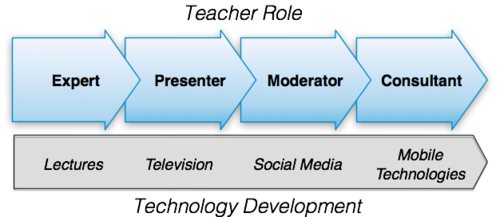The role of the teacher in mobile learning
Today we have a retreat meeting with the mobile learning research group. One topic that we ran into today is the role of the teachers in mobile learning. In this discussion school television came up as an example as a driver for technological change in schools. The problem with this metaphor is that it is perfectly inline with the content delivery approaches that we find all over the mobile learning world. However, mobile learning is more complex that it looks on the first sight and that the role of the teachers in mobile learning is not comparable with the role of teachers in school television.
The following graphic provides a very reduced overview of the content of the rest of this article that covers my view on the topic.
Before school television the main role of the teacher was the role of the domain expert that presents relevant information to the learners, who are themselves considered as novices who need (rather than want) to learn. The early types of school television in the 1970's and 1980's followed this role division. This kind of school television has been replaced by concepts such as those of the discovery channel, which is more related to concepts incorporated to CTV's Sesame Street or the German "Sendung mit der Maus" rather than the early lectures of school television. These formats are part of what has been later coined as "Edutainment".
The transition of the media formats changed the role of the average teacher from being an expert towards being a presenter of the expertise of others. This transition was mainly caused by production means, where it is hardly possible for the teachers to produce the kind of learning material that is produced by professional TV production teams. This kind of role shift was already observable with the introduction of VHS video players and photo copiers in school. One important aspect of this kind of educational media is that the role of the learners is not questioned.
With the Web and social software many things have changed. Suddenly, learners can choose the media channels and challenge the presented perspectives of their teachers. This did and still is empowering the learners and tackles the authority of the traditional domain expert. In these settings the role of the teachers needs to change from the presenter of knowledge to a moderator of (possibly) opposing positions. This role is much more challenging than being a presenter. In this role teachers need to accept different opinions and positions, relate and integrate them, and guide the process of knowledge selection and acquisition. This task is challenging because it demands a great deal of confidence, procedural structure, and flexibility as new perspectives may occur and challenge what is said at any point of the process. Yet, the moderating teacher holds the key for which information is selected and accessible to the learners.
I would argue that mobile learning breaks this even further as learning processes are no longer limited to clearly defined learning settings. These settings were the classrooms and lecture halls in the educational institutions or the study rooms at the students' home. This separation is not challenged by the Web and social software. With mobile learning learning settings become seamlessly integrated with settings that were previously not considered for learning and connected to activities that were not considered as learning. This has the consequence that moderating learning processes become unmanageable because different learning processes can overlap and interact. Learners can connect activities idividually, and learners can identify specific learning needs in different situations at any time.
Particularly, the effect of overlapping processes has been identified by schools as a prime problem and has lead to the denial of mobile devices during lessons. Although "distraction" is put as the main reason by teachers and school officials, I think that the core is more related to the change of how learning is perceived. The seamless integration of mobile technologies into everyday's live shifts the teachers out of the center of the educational processes in schools and challenges their role in these processes. From this perspective learners want to learn rather than need to learn. This implies to accept and to facilitate the learners' responsibility for their own learning. For teachers this creates the problem of focussing the students' learning interests. A moderating teacher would guide the learners back to the scope, forbid the switch to other contexts, and kill the transition of learning processes to other contexts.
In order to respond to the learners' changed role and responsibility, the role of the teacher changes slowly towards the role of a consultant. In this role, teachers need to be able to identify the learners interests, relate these interests to topic related learning goals, and offer opportunities to reach these goals that are related to the specific conditions of a learner. Such integration also implies that teachers may face that learners consult different persons in order to meet their goals. This requires teachers to be able to identify these links, align the related learning opportunities, and engage with a wider range of parties (stakeholders or experts) who are involved in these learning processes. Teachers acting as educational consultants for learners were already present in street and community schools in the 1960's and 1970's, before these schools have been canceled by the emerging neo-liberal educational agenda. These schools already perceived learning as a mobile experiece despite their lack of mobile technologies.
When we look at mobile learning in schools it is needless to say that the role of the teachers is crucial. However, in order to make mobile learning happen at the large scale we need to revisit and tackle how many teachers perform their role as "experts", "presenters", "moderators", and "consultants".
